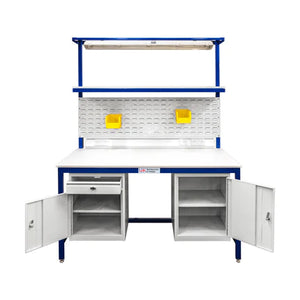0161 688 6737
5 food hygiene tips for restaurants and cafes
There are no grey areas when it comes to food hygiene standards. For restaurants, cafés and other food production facilities, prioritising cleanliness isn’t just best practice - it ensures the safety of your customers and safeguards your business.
Here at UK Workbenches, we have seen first-hand how exceptional food hygiene is pivotal in every area of the food industry. That's why our experts have compiled five essential food hygiene tips to help you uphold the highest standards of cleanliness and compliance.
1. Hand hygiene
Start with the basics – handwashing. Encourage thorough handwashing among your staff, especially before handling food or after touching any potentially contaminated surfaces. Proper hand hygiene helps prevent the spread of harmful bacteria and viruses, reducing the risk of foodborne illnesses.
According to research in the US, 80% of communicable diseases are transferred by touch but only 33% of people wash their hands before preparing food. Furthermore, 50% of all foodborne illnesses are due to failing to wash hands correctly.

2. Maintain clean surfaces
Ensure all surfaces in your food production area, including worktops, chopping boards and equipment, are regularly cleaned and sanitised. Stainless steel tables, known for their durability and non-porous surface, are ideal for food preparation areas as they are easy to clean and resistant to bacterial growth.
3. Separate raw and cooked foods

To prevent cross-contamination, keep raw meats, seafood and poultry separate from ready-to-eat foods during storage, preparation and serving. Use designated stainless steel workbenches for each task to minimise the risk of contamination and maintain food safety standards.
The Food Standards Agency offers plenty of advice on avoiding cross contamination, including washing hands after touching raw food and keeping different equipment/utensils for raw food. Ideally, raw and read-to-eat food should be kept in separate fridges.
4. Monitor food temperatures
Keep a close eye on food temperatures to ensure that hot foods stay hot and cold foods stay cold. Invest in quality food thermometers and temperature control procedures to maintain the integrity and safety of perishable items.
5. Food storage
Store perishable foods promptly and at the correct temperatures to prevent spoilage and bacterial growth. Use stainless steel shelving units and refrigerated storage solutions to organise and preserve food items effectively, prolonging their shelf life and reducing waste.
Finally, there has been a lot of publicity surrounding the dangers of food allergies, so restaurants and cafes need to show awareness by providing allergen information on labels and menus. It is vitally important to adopt food allergen policies in all food preparation operations, so staff should receive the appropriate training.
Searching for stainless steel workbenches?
Our range of stainless steel workbenches have been designed to play a key part in the food hygiene standards of any food production facility.
Stainless steel is a non-porous surface so inhibits the growth of bacteria, making it easy to clean. Resistant to corrosion, and staining, our stainless steel benches are built to withstand the demands of commercial kitchens. Available in various sizes and configurations, our benches offer flexibility to suit different food preparation tasks and space requirements.
In conclusion, by implementing these five food hygiene tips and incorporating stainless steel workbenches into your food production environment, you can ensure compliance with regulations, protect the health of your customers and elevate your quality standards.
For more information, please contact our friendly and professional team.
